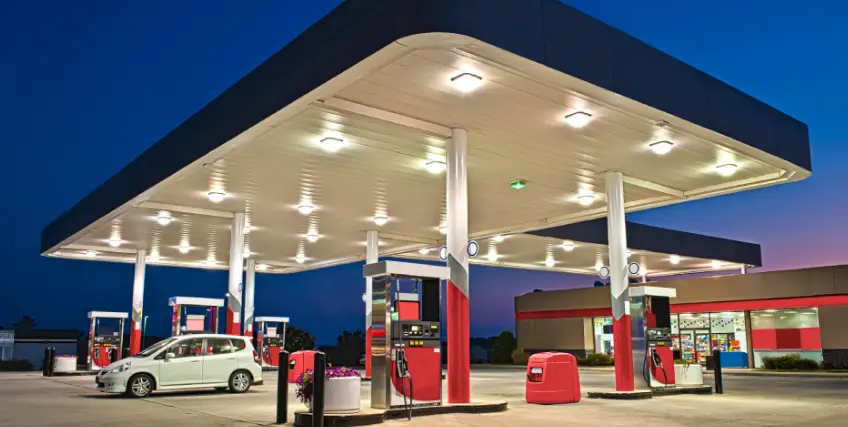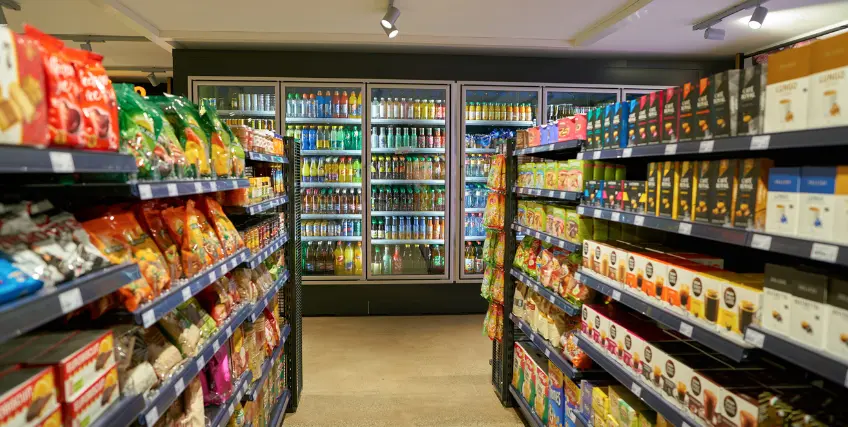Is Business Financing the Right Choice for Your Convenience Store Expansion?
February 14, 2025 | Last Updated on: February 17, 2025

Is Business Financing the Right Choice for Your Convenience Store Expansion?
Convenience stores are some of the most common businesses in America. The 2024 NACS/NIQ Convenience Industry Store Count found more than 150,000 convenience stores in the U.S., with 2,222 added last year.
Expansion is one of the best ways to increase your competitive edge and raise profit potential, and a convenience store business loan may help you do just that. There are several types of loans and financing options that could support your dream of expanding. We will delve into convenience store financing here.
In this article:
- How you can use a convenience store business loan to grow your business
- Convenience store loans that can help your business expand
- How to get convenience store financing
Benefits of Convenience Store Financing
Convenience stores often operate on tight margins and can suffer from inconsistent consumer traffic, sudden equipment breakdowns, and other financial pressures. These unpredictable issues can strain your business’s cash flow, which is one of the main reasons why expansion is so smart. If one store is dealing with an issue, another can pick up the slack for a time.
Convenience store business loans and other financing options can give you access to cash in emergencies and allow you to invest in your business by improving technology, upgrading facilities, or even opening a new store. Some of the key benefits may include:
- Cash flow improvement: An influx of cash can support your working capital, allowing you to cover inventory replenishment, employee wages, utility bills, and more operating costs without disrupting daily business.
- Equipment upgrades: Convenience stores utilize a range of equipment, from refrigeration units and coffee machines to point-of-sale systems and self-checkout counters. A convenience store business loan can function as equipment financing to improve efficiency and increase your margins.
- Inventory management: Keeping the shelves stocked is a constant challenge for convenience stores, especially when they’re strapped for cash. Convenience store financing may allow you to purchase inventory or make new relationships with convenience store distributors to avoid stark shelves and keep customers happy.
- Expansion: Finally, each of these benefits support expansion by allowing you to improve operations and increase your profit margins. A C-store business loan may provide the necessary funding to acquire real estate and launch a new store.
Types of Convenience Store Financing
If you’re considering expansion, convenience store business loans are likely the best option, but other financing options can support different aspects of your business. These are some of the most common types of business financing for stores.
Term loans
Term loans are conventional loans that provide an upfront lump sum payment in exchange for repayment terms, plus interest. Both traditional lenders and online lenders offer these flexible small business loans that you can use for virtually any business purpose.
Depending on the lender, you may need to meet a qualifying credit score requirement, have a certain amount of time in business, and meet annual revenue benchmarks. You might have to put up business assets as collateral to secure the loan.
You may improve your chances of approval during the loan application process if you provide a business plan with a clear vision for how you’ll use the money for expansion or other purposes.
To get better interest rates on a convenience store business loan, you’ll need a high credit score and good revenue reporting.
SBA loans
The United States Small Business Administration (SBA) backs several loan programs available through SBA-approved lenders. These loans often have strict eligibility requirements, but because the SBA partially guarantees the loan amount, it lowers the risks to both lenders and borrowers. Thanks to their competitive interest rates and loan terms, SBA loans can be great options for convenience store business loans.
The SBA 7(a) loan is the most popular loan program, allowing small business owners to borrow up to $5 million through an approved lender. This money can be used for virtually any business purpose, from buying inventory and purchasing equipment to renovations, hiring staff for a new location, and more.
If you just need a small influx of working capital, you may also leverage the SBA’s Microloan program, which offers faster funding times for smaller loan amounts.
Commercial real estate (CRE) loans
Convenience store owners looking to expand might consider buying a commercial property rather than leasing one. That way, you can truly design a store in your branding and won’t have to deal with restrictions from a landlord.
A commercial real estate loan is a financing option for purchasing commercial real estate. While with other loans, you might have to put up collateral or provide a personal guarantee, a CRE loan is typically tied to the asset itself. So, if you fail to repay the loan, the lender may repossess the property.
Working capital loans
Slowdowns in business or emergencies can force you to dip into discretionary funds, which may make it more difficult to save for expansion. Rather than reducing a potential down payment on a convenience store business loan, consider a working capital loan. These short-term loans typically offer fast funding and repayment terms of about a year or less, depending on the lender. They’ll give you a small infusion of capital to cover day-to-day expenses until business picks up, so you don’t have to reduce your savings.
Business lines of credit
A business line of credit is a flexible funding solution for convenience stores and other business types. This financing gives you a maximum approved credit amount that you may draw upon when you need money. Rather than paying interest on the full amount, you only pay interest (and fees) when you make a withdrawal. Most business lines of credit are revolving, meaning once you repay the borrowed amount, you’ll have access to the full loan amount again.
Lines of credit are a low-cost way to get short-term financing to cover working capital needs and can help you avoid digging into emergency funds or money earmarked for a new store.
Equipment loan
When you open a new location, you’ll likely have to acquire equipment like refrigeration units, coffee machines, and more. While you can budget for that with a lump sum convenience store business loan, you may prefer to work directly with c-store equipment suppliers to purchase equipment. Many suppliers offer equipment financing through which the equipment itself serves as collateral for the loan.
Merchant cash advances (MCAs)
Finally, merchant cash advances (MCAs) are not loans, but they may be useful tools for convenience store owners looking to expand.
In an MCA, you work with an MCA provider to get an upfront amount of money in exchange for a percentage of future sales. Typically, repayments are processed daily or weekly as a percentage of your debit or credit card sales in that period. You continue paying back the cash advance until you’ve reached a total repayment amount, determined by a factor rate.
If you’re in a situation where you need a small amount of capital to get your next location off the ground, an MCA can be a good way to get it moving and repay the debt as the business gets going. Remember, though, an MCA cuts into your profits, so you should be absolutely sure you’ll be able to do enough business to keep the new store afloat.
Things to Consider Before Getting a Business Loan
Getting a business loan is a major decision. While the prospect of investing in your business is exciting, of course, loans put your business in debt and add a significant line item to your monthly balance sheet.
Before moving forward with a business loan, it’s important to consider the following:
- How you’re currently managing finances: Convenience stores have complex inventory management requirements, staffing needs, and more factors that influence your accounting. A lender will want to see your books, so it’s important to make sure you have a good bookkeeping and accounting system in place that fully represents your business. If you don’t have one already, it’s a good idea to invest in point-of-sale software.
- How much you need: Financial projections can be difficult, but it’s important to calculate the total cost of opening a new store as best as you can. Visualizing exactly how you’ll use the money in a business plan may help your application get approved by a lender.
- How long you want to have the debt: Bigger loans typically carry longer repayment terms, which is good for reducing your monthly payment, but may hamstring your business’s availability to grow. The faster you can pay it off, the faster you can bank larger profits.
- Collateral: Most loans — especially larger ones — will require collateral. That collateral might be accounts receivable, your current convenience store mortgage, inventory, or other business assets. If you’re taking out a convenience store business loan, it’s absolutely vital to ensure you can afford the loan so you don’t forfeit business assets that may put your business in a deeper hole.
How to Get a Convenience Store Business Loan
Depending on the lender and type of loan, the application process may take anywhere from a few days to a few months. To get a loan and streamline the process, follow these steps:
1. Figure out the funding and loan type you need: Before you shop for lenders, do some bookkeeping and projection work to figure out how much you can afford for a down payment, a monthly payment you can afford, and how you will use the funding you get. For something as complex as opening a new store, it’s a good idea to be as granular as possible with your accounting and communicate your vision in a business plan.
2. Shop lenders: When you know what kind of loan you’re looking for, compare lenders online to view their minimum requirements, available interest rates, and customer testimonials. You can find out a lot online, but it’s a good idea to call or visit a lender in person to vet them yourself before committing.
3. Gather documents: To get a convenience store business loan, you’ll need business owner and business documentation, financial statements, tax returns, a business plan, and any information about outstanding debts or liens.
4. Apply: When you have all of the necessary documentation ready, you may apply online with some lenders or go to a branch to apply in person. Then, it’s just a matter of waiting for approval.
Final thoughts
Running a convenience store can be a rewarding business, but it’s also a challenging one. One of the best ways to increase your profit margins and reduce financial strain is by expanding the business. A convenience store business loan can help cover the costs of opening a new store and set you up for success. You might not compete with the giant convenience store companies right away, but opening a second store is the first step towards building your own empire.
FAQs on Convenience Store Business Financing
How much does it cost to open a convenience store?
Toast estimates that it costs between $50,000 to $100,000 to open a convenience store.
What are the best convenience store business financing?
Some of the best convenience store financing options include term loans, SBA loans, business lines of credit, or short-term funding like working capital loans.
How can you use a business loan?
Convenience store owners can use business loans for a wide range of business purposes, from hiring staff or purchasing inventory to investing in expansion. Secured loans like commercial real estate loans or equipment loans, however, must be tied to a specific asset.
What are the benefits of getting a convenience store business loan?
Getting funding for your business can increase cash flow to cover day-to-day expenses and build your emergency fund, allow you to purchase more inventory, let you invest in equipment upgrades, and may give you the money necessary to open a new store.
How do you get a business loan?
To get a business loan, you must first assess how much you need and what kind of loan is right for your situation. Then, research and compare lenders and terms before deciding on where to apply for a loan. Once you’ve applied, it’s just a waiting game until you’re approved or denied the funds.
Frequent searches leading to this page
Related Articles
The Fuel for Success: Innovative Ways to Finance Your Gas Station Convenience Store
February 17, 2025
Rising Stars in a Tight Credit Market: Gas Stations & Convenience Stores
February 17, 2025
Is Business Financing the Right Choice for Your Convenience Store Expansion?
February 17, 2025




